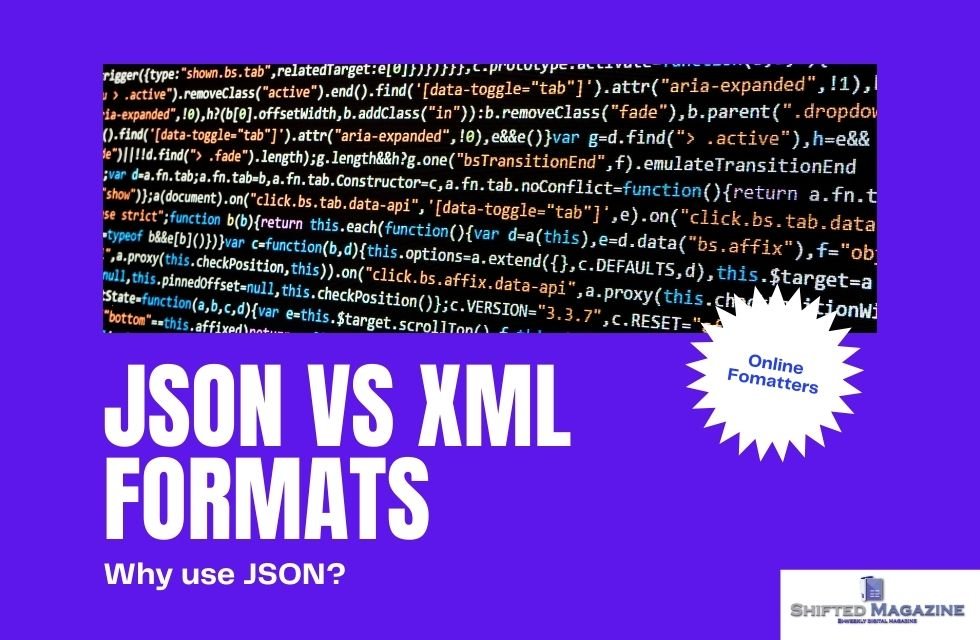Programming
Why use JSON? Best features of JSON over XML formats

JavaScript Object Notation, more popularly known as JSON exists as a lightweight, digital, organization that is utilized for clear information exchange. Considered as a subset of JavaScript, JSON has quickly become a market favorite alongside JSON format checker and JSON format validator services.
It primarily consists of an assortment of esteem sets, located in different dialects. This collection is acknowledged as an article, a record, a word reference, a keyed rundown, or an affiliated exhibit. Alongside which exists an arranged rundown of qualities, acknowledged as an exhibit, a vector, or a succession.
The need for JSON and subsequent JSON formatter online services
First and foremost, JSON permits its users to beat the cross-area issue by allowing them to utilize a technique called JSONP. This makes use of a callback capacity to send the information to the backup domain. Opening up an array of entryways that initially were labeled as hard to workaround.
JSON and JSON formatter designs are utilized for program expansions and sites, written in the JavaScript language. Allowing consumers to program around such utilities. Also, alongside XML, JSON sends organized information to users of web applications. Habitually serializing and transmitting digital data.
A brief overview of the phenomenon
The advent of AJAX over time has made it increasingly significant to have the option of stacking digital data quickly as well as asynchronously without deferring page delivery. In the current view of the prominence of online media, numerous destinations depend on the practice.
Talking about JSON formatter and JSON itself. What happens is, that these utilities are not difficult to import. However, if we attempt to stacking them with AJAX, a wall is run into. This creates a problematic scenario despite the ease and efficiency offered by these applications.
Why use JSON? The big question.
JSON as an information design alongside JSON formatter services as a popular by-product, are generally utilized in the programming of Web administrations and APIs to give out public information. To state the least, the application is easy to peruse and hassle-free to compose. A straightforward book-based utility.
Perks that make it a favorite among other options
To top it all, it is a lightweight information trade design. Considering the variety of online JSON formatter online utility like JsonOnline.net makes it not just one but two chances to utilize to their maximum potential. Serving to be an autonomous structure, broadening the extent of its utilization along with other programming dialects.
The utility can be utilized with numerous other programming dialects. The list includes names like JavaScript, C++, C, PHP, Python, Ruby, PERL, Java, so on and so forth. But the advantages do not end here. As established before, the pivotal features that sell it are its information move and trade space.
Delving into the specifics
When we talk about JSON, we also have to talk about JSON formatter applications. It is a necessity to do so. The design offers a much more modest size than others, also it does not require convoluted libraries for parsing or handling data. This permits the accessibility of numerous dialects and conditions.
In the case of JavaScript, JSON can be effectively-prepared to utilize objects with a standard JavaScript work. Adding onto the list, JSON has increasingly become the favored organization to use in the web-based market. In the case of large amounts of data, JSON turns out to be exceptionally critical and convincing.
We are not saying this, but XML loses this one
Back in the day, there was a time that XML serves as the ideal tool for information trade. But today as we stand in the twenty-first century, different improvements in the field of data exchange have made JSON and JSON formatter applications a tough competitor to XML.
Here’s a list to back up the claim
- JSON is much lighter as compared to the conventional XML format.
- The access time utilized by JSON to parse information is much less than XML.
by utilizing standard JavaScript work. JSON is parsed into a prepared to-utilize
- In the realm of information parsing, it is agreed that XML is substantially more hard to parse than JSON.
- It is also the case that, JSON requires fewer labels than XML.
- JSON is transportation free.
- JSON scores over XML with its information game plan more unsurprising than the latter.
- As discussed before, numerous dialects can simply guzzle in JSON to track down their area object easily.
- Due to a restricted arrangement of articles, JSON and JSON formatter makes more straightforward, and simple-to-understand codes.
- There is a wide variety of JSON formatter applications available on the Internet that not only format but also validate, edit and beautify your JSON.
Final Verdict for JSON
Necessity is the mother of invention. This phrase is well articulated when it comes to the evolution of information trade designs. From XML to JSON and a bunch of other options. Alongside added perks like JSON formatter, it has been a treat for individuals interested in data exchange and should be used aptly.
Read more: Top 5 Mistakes of Java Developer
-

 Entertainment1 month ago
Entertainment1 month ago123Movies Alternatives: 13 Best Streaming Sites in 2026
-

 Entertainment2 months ago
Entertainment2 months ago13 Free FMovies Alternatives to Watch Movies Online in 2026
-

 Entertainment1 month ago
Entertainment1 month ago13 Flixtor Alternatives to Stream Free Movies [2026]
-

 Entertainment1 month ago
Entertainment1 month agoGoMovies is Down? Here are the 11 Best Alternatives






